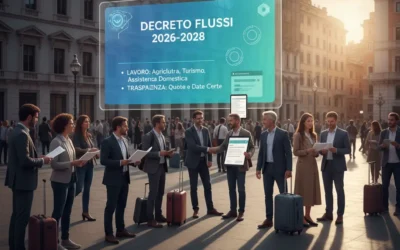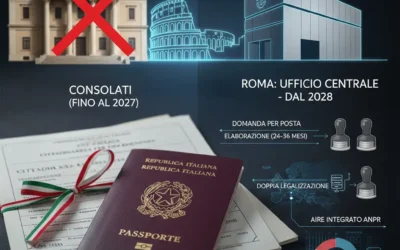Law 74/2025 (conversion of Decree Law 36/2025) has introduced profound changes to the Italian citizenship recognition system by descent, imposing new limitations and requirements that exclude millions of people of Italian origin.
This article highlights some legal criticalities and evident conflicts with fundamental principles established by the Italian Constitution and the Italian legal system, such as the right to equality, protection of citizenship as original status, prohibition of retroactivity of worsening laws, and legitimate expectations of citizens.
I. The Innovations Introduced by Law 74/2025.
The new Italian Citizenship Law 74/2025 establishes the “exclusivity clause,” meaning that Italian citizenship by birth can be transmitted only if the grandfather or parent from whom the right is derived possesses/possessed exclusively Italian citizenship.
As partial mitigation, the law allows acquisition of citizenship if a parent resided in Italy for at least two years after acquiring Italian citizenship and before the child’s birth or adoption.
However, this clause – also retroactive – is hardly practicable for most emigrant communities, whose ties to Italy are often cultural, emotional or symbolic, and not linked to continuous residence.
Furthermore, a new burden of proof has been introduced for the interested party, who must demonstrate non-acquisition of foreign citizenship.
For minors, the condition of residence in Italy has been added.
II. Premise – The Italian Constitutional and Legal Principles at Stake.
Before examining how the new law appears illegitimate, it is useful to recall the articles involved and their meaning.
A) The Principles of the Italian Constitution
Article 2 – Inviolable Rights
“The Republic recognizes and guarantees the inviolable rights of man, both as an individual and in the social formations where his personality develops, and requires the fulfillment of inescapable duties of political, economic and social solidarity.“
This article recognizes fundamental rights that preexist the State (e.g., dignity, identity, citizenship, family). Such rights cannot be compressed or denied arbitrarily and must always be guaranteed.
Article 3 – Equality
Article 3 of the Italian Constitution provides that:
“All citizens have equal social dignity and are equal before the law, without distinction of sex, race, language, religion, political opinions, personal and social conditions…“
The article guarantees formal and substantive equality: every citizen must be treated the same way by law, and the State must actively remove factual inequalities.
Article 22 – Citizenship and Personal Rights
Art. 22 of the Italian Constitution provides that
“No one can be deprived, for political reasons, of legal capacity, citizenship, name.”
Essentially, Article 22 protects the legal personality of the citizen, prohibiting deprivation of the capacity to hold rights and duties, of belonging to the State, or of one’s name, which are fundamental elements of identity.
Art. 72 Reserved Legislative Matters to the Parliament
Article 72 of the Italian Constituion provides for
the reservation to the Parliament in full assembly of thepower to legislate on certain matters, such as constitutional issues, electoral laws, delegated legislation, budgets, and final account.
B) The Principle of the Preliminary Provisions (art. 11 Preleggi)
In the Italian legal system, the Preleggi (Preliminary Provisions to the Civil Code) are a set of articles that regulate the law in general, providing the basis for its interpretation and application.
Art. 11 of the Preleggi provides: “The law provides only for the future: it has no retroactive effect.“
This article affirms the principle of non-retroactivity of law: a norm can only regulate facts subsequent to its entry into force, unless it is more favorable.
III. The Original Nature of Italian Citizenship
Citizenship by Birth Is a Permanent, Original Right
The rationale of law n. 91/1992 is that citizenship is acquired by birth. A person who was born (for example) 20 years ago abroad is already an Italian citizen.
The Corte di Cassazione (ruling of the United Sections, n. 25137/2022) confirmed that:
“Citizenship by fact of birth is acquired by original title. The status of citizen, once acquired, has a permanent and imprescriptible nature. Recognition of citizenship has recognitive value, and does not require any attributive act by the State.“
This means citizenship recognition is merely declarative—acknowledging an existing right rather than granting a new one.
IV. Italian Law 74/2025: why it may be (soon) considerate unconstitutional.
1. Violation of Article 11 Preleggi-Retroactive Loss of Citizenship
The retroactivity of the law (and consequent retroactive loss of citizenship) is applied to subjects already born, who, as previously explained, were already holders of the right, in violation of art. 11 of the Preleggi.
2. Violation of Article 3 of the Constitution – Discrimination Against Italian Descendants
a) Discrimination between Exclusive Citizens and Dual Citizens.
The exclusivity clause, as previously explained, has a sweeping effect, discriminating without any rational justification: it excludes millions of descendants now deprived of citizenship recognition.
The law creates an arbitrary distinction between “exclusive” and “dual” citizens, furthermore despite no substantial difference in their connection and genuine link to Italy.
b) Arbitrary Deadline Application.
The law establishes that the new provisions apply to all those who have not submitted an application by March 27, 2025.
No time window period or safeguard clause is provided for those who could not activate the procedure for reasons not attributable to them — for example, the notorious difficulty in obtaining appointments at Consulates.
Depriving ex post a subject of the right to recognition, only because they have not yet formalized it, amounts to:
- An unacceptable forfeiture of a subjective and constitutional right already arisen;
- A disparity of treatment in violation of art. 3 of the Constitution (for example between those who sent the request one hour before 23:59 PM (Rome’s time) on March 27, 2025 and those who sent it one hour after).
3. Violation of Article 22 of the Constitution – Citizenship Cannot Be Revoked Arbitrarily
As explained above, art. 22 of the Italian Constitution prohibits deprivation of citizenship for political reasons. Loss can only occur with adequate procedural and substantive guarantees.
The reform instead deprives of citizenship, based on subsequently introduced requirements, not dependent on their behavior, configuring a forfeiture in contrast with the guarantee principle of art. 22 of the Italian Constitution.
4. Violation of the Principle of “Legitimate Expectations”
The principle of legitimate expectations in the Italian Constitution is a principle not expressly established, but which derives from jurisprudence, particularly from the Constitutional Court.
It consists in protecting the interest of those who have reasonably relied on an advantageous situation, guaranteed by an administrative act or a norm, and which cannot be subsequently revoked or changed without adequate justification.
Italian jurisprudence recognizes that the legislator can intervene in subjective rights, but must also protect the legitimate expectations of society members. This is especially true when legal and humanly choices juridically protectable derive from them.
The total absence of a transitional period or safeguard clauses for those who had already started a path or matured a consolidated situation represents a serious injury to this principle.
5. Violation of Article 72- Misuse of the Decree Law Mechanism
Art. 72 of the Constitution provides for Parliament assembly legilsative reservation for certain matters: “constitutional, electoral, legislative delegation, budgets and final accounts“.
Citizenship is a constitutional matter, and the legislative procedure should have been entrusted ex art. 72 Italian Constitution to the Parliament assembly; therefore the ordinary procedure should gave been followed.
Instead, the legislative procedure of the urgency decree law was used, which leaves less space for parliamentary debate due to its strict times for approval, and is therefore less guaranteed.
In addition, there were no urgent reasons to adopt a decree law. The problems deriving from the millions of applications that worried the government has been around for decades.
V. To Sum It Up – A Constitutionally Fragile Law
The new law:.
-
Affects already settled legal positions.
-
Grants citizenship under the old rules only to those who submitted their application by March 27, 2025 – 23:59 (Rome’s time). This ignores, for example, long wait times to book an appointment at consulates. It introduces an arbitrary, unreasonable, and strongly discriminatory criterion.
-
Operates an arbitrary and unreasonable selection based on hostility toward dual citizenship. Dual citizenship has always been allowed in Italian law. The difference between “exclusive” and “dual” citizens is discriminatory and has no real basis. It penalizes those with automatically acquired dual citizenship, creating an unfair gap in access to a fundamental right.
-
It could not be changed using the decree law method
VI. How Law 74/2025 on Italian Dual Citizenship Can Be Challenged Before Italian Courts
Individuals who find themselves excluded from citizenship recognition due to the new restrictions introduced by Law 74/2025 may initiate a legal challenge before the ordinary civil courts. In such proceedings, applicants can raise a constitutional legitimacy question (questione di legittimità costituzionale), asking the court to refer the matter to the Constitutional Court. This referral can occur if the judge deems the new law potentially unconstitutional in light of fundamental and constitutional principles as previously explained.
These challenges are especially relevant for applicants who would have had a valid claim under previous legislation but are now arbitrarily excluded due to retroactive and discriminatory provisions.
This is not the only avenue for challenging the law: a referendum abrogativo (abrogative referendum) could also be pursued to repeal the legislation, although this route requires a complex and lengthy procedure involving the collection of signatures and scrutiny of the Constitutional Court.
Meanwhile, legal professionals and affected individuals await with great interest the Constitutional Court’s hearing which is expected to be discussed on June 24, 2025.
The Court of Bologna, on November 16, 2024 spontaneously raised a constitutional question regarding the Italian citizenship, challenging the unlimited temporal recognition of jure sanguinis. The issue was specifically raised in reference to Article 1 of Law No. 91 of February 5, 1992, which provides for citizenship by descent without any generational time limit.





